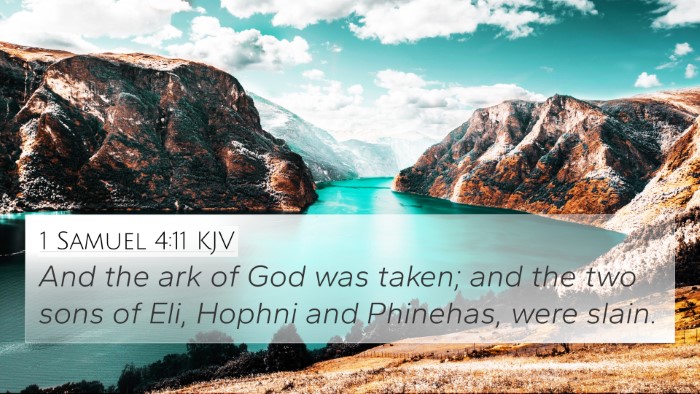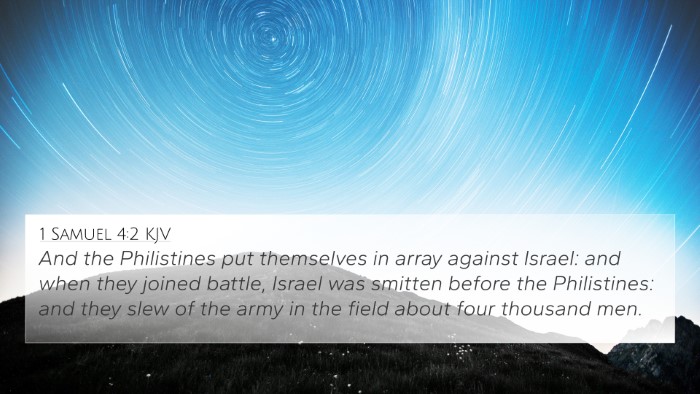Understanding 1 Samuel 2:31
Bible Verse: 1 Samuel 2:31 - "Behold, the days are coming, when I will cut off your arm and the arm of your father's house, that there shall not be an old man in your house."
Overview
The verse serves as a grave warning from God to Eli and his descendants. It signifies a pivotal moment where divine judgment is pronounced, and it highlights the consequences of failing to honor God appropriately.
Commentary Insights
Matthew Henry's Commentary
Matthew Henry emphasizes the necessity of reverence towards God. The "arm" represents strength and power, and God’s message to Eli indicates the complete removal of strength from Eli’s lineage due to their disregard for divine instructions. This warning points to the seriousness of sin and the eventual judgment that follows when God's authority is undermined.
Albert Barnes' Notes
Albert Barnes highlights the prophetic nature of this declaration. He points out that it communicates not only immediate punishment but also foreshadows the disastrous future of Eli's household. The personal and communal implications of this separation from God’s blessing are profound, resulting in a lineage devoid of vitality and honor.
Adam Clarke's Commentary
Adam Clarke elaborates on the sociocultural implications of the text. He discusses how the removal of the "old man" symbolizes the loss of wisdom and guidance, which is critical for the people of Israel. Clarke connects this to the broader theme of God’s covenant and the expectations placed on Israel’s leaders.
Thematic Connections
This verse is intertwined with several themes in Scripture, including:
- Judgment: Reflective of God's response to sin, directly linked to Deuteronomy 28:15, where failure to obey leads to curses.
- Leadership Accountability: Echoes the responsibilities of leaders as seen in James 3:1, which addresses the stricter judgment for teachers.
- Divine Sovereignty: Affirms God's control over His chosen people, connected to Daniel 4:35, highlighting that God's will cannot be thwarted.
- Covenant Relationships: Relates to Jeremiah 11:10, where transgressing covenant leads to dire consequences.
- Prophetic Warnings: Similar to Ezekiel 18:30, where God calls His people to repentance to avoid destruction.
- Generational Consequences: Tied to Exodus 20:5, illustrating how the iniquities of the fathers affect future generations.
- Hope for Restoration: Provides a contrast to the desolation mentioned in Isaiah 60:22, where hope is promised despite judgment.
Cross-References for Deeper Study
To fully grasp the implications of 1 Samuel 2:31, consider exploring the following cross-references:
- 1 Samuel 3:11 - Further pronouncement of judgment on Eli.
- 1 Kings 2:27 - Fulfillment of God's word against Eli's household.
- Malachi 2:1-3 - Consequences of unfaithfulness in priestly duties.
- Hebrews 10:31 - The seriousness of falling into the hands of the living God.
- Isaiah 47:1-3 - God's judgment upon Babylon, echoing themes of divine retribution.
- 2 Kings 10:30 - God's word concerning judgment fulfilled through Jehu.
- Revelation 3:19 - Call to repentance parallels God’s plea to Eli.
Using Cross-References
Engaging in scripture cross-referencing can significantly enhance understanding of Biblical texts. Below are some tools and methods for effective Bible study:
- Bible Concordance: A useful reference tool for finding related verses.
- Cross-Reference Bible Study: Methods for examining connections between verses.
- Bible Reference Resources: Materials available for deeper examination of themes and ideas.
User Intent
Understanding 1 Samuel 2:31 and its implications leads to various inquiries about related verses:
- What verses are related to 1 Samuel 2:31?
- Find cross-references for Eli's judgment.
- How do this verse and Hebrews 10:31 connect?
Conclusion
The study of 1 Samuel 2:31 offers profound insights into God's justice, the weight of leadership, and the enduring consequences of actions taken in disobedience. By examining this scripture through a cross-referenced lens, the reader gains a deeper appreciation for the interconnectedness of the Biblical narrative.












